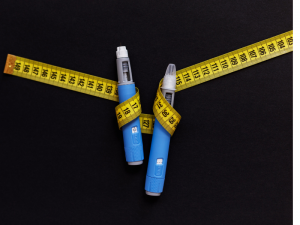Picking up from part 1 (read it here), which explored what GLP-1 weight loss injections are, who they’re for, and how they work, we now focus on the risks, realities, and practicalities — what to watch for, how to use them safely, and what truly supports long-term success.
1110 words (approx), 6 minutes read
Understanding the Risks
- No medication is without risks. Common side effects of GLP-1 injections include:
- Nausea, bloating, or constipation
- Vomiting (usually temporary)
- Feeling tired or low on energy, especially early on
A key concern is muscle and bone loss if movement and nutrition aren’t supported alongside medication.
Less common but serious risks include:
- Gallbladder issues like gallstones or inflammation
- Thyroid problems, including a possible increased risk of thyroid tumours
- Pancreatitis, which requires urgent medical attention
- Mood changes, such as increased anxiety or a low mood
Ensuring Safe and Appropriate Use
- Misuse of weight loss medications is an increasing concern, particularly outside of proper medical guidance.
Buying these drugs online without clinical supervision is risky, but becoming more common. - Some individuals with a healthy weight use them to slim down for holidays or events, despite having no medical indication.
- Young people may feel pressured to conform or meet appearance expectations.
- Those with current or past eating disorders are especially at risk. Misuse can worsen both physical and mental health.
- Counterfeit versions are widely available on the internet, often marketed to vulnerable groups, including teenagers and young adults.
NHS Access Criteria
In the UK, NHS access is strict, aiming to ensure safe, appropriate prescribing:
- Referral to Tier 3 or 4 specialist weight management services, part of a structured multidisciplinary program (wait times can be long)
- BMI over 35 with at least one weight-related health condition (e.g., type 2 diabetes or hypertension)
- A BMI between 30 and 34.9 may qualify if other health issues are present.
- Evidence of previous lifestyle attempts, such as diet and exercise
- Participation in supervised treatment, including dietary, physical activity, and emotional support
- Review at 6 months; continuation requires a minimum of 5% weight loss.
- Prescription is typically limited to up to 2 years under NHS care.
Private Access and Costs
Private prescription options offer fewer barriers but can be costly, creating inequalities. Some private providers have looser eligibility criteria, allowing treatment for people who don’t meet NHS rules, which raises questions about fairness and consistency.
Interestingly, several of my patients report their food and alcohol bills dropping after starting GLP-1 injections due to reduced appetite and cravings. For some, these savings help offset the costs of medication and support lasting lifestyle changes.
Before Starting, Ask Yourself:
- Why now? What motivates you?
- Have you tried other approaches first?
- Are you medically suitable?
- Can you afford this for 12 to 18 months?
- Who will support you on this journey?
- Do you have a plan for energy, movement, and nutrition?
- What is your plan for when you stop?
Weight regain is typically, and often rapidly, after stopping unless lifestyle changes continue. Addressing psychological aspects of food is crucial, as the “food noise” will return otherwise.
What to Expect When You Start
Most start on a low dose, gradually increasing over weeks or months to reduce side effects. Early symptoms can include:
- Nausea
- Digestive changes (bloating, constipation, or diarrhoea)
- Fatigue from eating less, sugar dips, or poor sleep. Fatigue usually improves after a few weeks. Meanwhile, rest, nourish yourself, and keep moving gently.

Medication Interactions and Supplement Support
GLP-1 medications slow digestion, which can affect the absorption of other medicines, including:
- Insulin or diabetes drugs (risk of low blood sugar)
- Thyroid medications (timing adjustments may be needed)
- Oral contraceptives (effectiveness may decrease)
- Painkillers and supplements
Always inform your provider about all medications you are taking. If your appetite drops too much, supplements you might need include:
- Protein
- Calcium, vitamin D, iron, and B12
- A general multivitamin
As always, it is prudent to seek guidance from a registered healthcare professional before starting supplements.
Why Movement Still Matters
Protecting muscle and bone health is essential. Strong muscles support metabolism, improve balance, promote bone density, and reduce the risk of injury. Include strength-based exercises like Pilates, bodyweight workouts, yoga, or resistance training. Walk daily and stay active. Eat protein-rich foods such as fish, tofu, beans, eggs, dairy products, and lean meats.
Bone and Muscle Health On and After Medication
As an osteopath and Pilates instructor, I see how GLP-1 receptor agonists can contribute to muscle and bone loss if nutrition and movement aren’t well managed. Maintaining strength and bone density helps protect metabolism, balance, and reduces the risk of injury.
How and When to Come Off Weight Loss Medication
Discontinuing GLP-1 medication should always be done with caution and under the guidance of a healthcare professional.
Key considerations:
- Some people use medication long-term; others stop after reaching a stable weight or if side effects become intolerable.
- Never stop taking your medication without consulting your doctor or prescriber, in most cases gradual tapering is advised.
- Establish sustainable habits in movement, nutrition, and emotional wellbeing before stopping.
- Expect a transition phase characterised by increased appetite, fluctuating energy levels, and challenges with maintaining weight.
- Support, including movement specialists, dietitian, and psychological and behavioural health professionals, can be invaluable in managing emotional eating.
The Role of Healthcare and Wellbeing Professionals
A team approach often yields the best results. Psychological and behavioural support helps manage the emotional aspects of weight loss and food relationships. As both an osteopath and Pilates teacher, I support joint health, muscle strength, energy, movement confidence, and emotional wellbeing, many people thrive with this integrated care.
Final Thoughts and Key Takeaways
Weight loss injections can be a helpful tool, especially for people dealing with ongoing weight-related health problems or co-morbidities. However, they’re not a magic fix or a quick route to a healthy weight in the long term. They work best when combined with mindful movement, looking after muscle and bone health, managing energy, and addressing emotional relationships with food.
Key Takeaways:
- Weight loss injections mimic natural gut hormones.
- They reduce appetite, improve blood sugar control, and lower inflammation.
- Not everyone qualifies or should use them; medical assessment is essential.
- Side effects are common but usually temporary; serious risks are rare, but it is necessary to understand them.
- The best results are achieved through a combination of regular physical activity and a balanced diet.
- Misuse is dangerous and reduces the availability of these resources for those who need them.
- NHS access criteria are strict; private options exist but can be costly.
- Professional support improves outcomes and wellbeing.
If you are considering or already using weight loss medication and want support to move better, feel stronger, and feel more like yourself again, get in touch. I’m here to help you feel confident and supported every step of the way.









